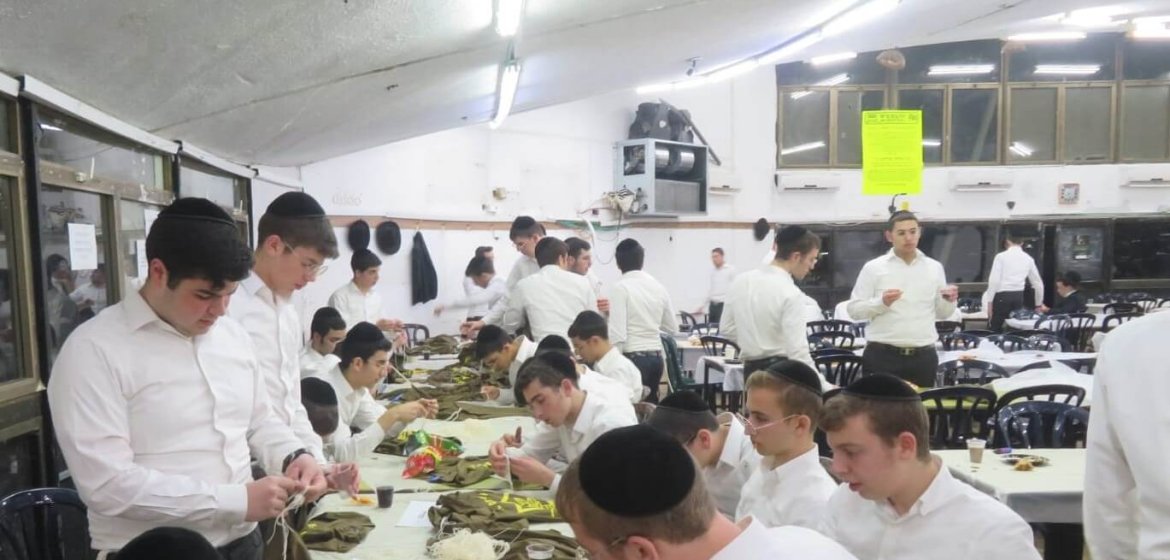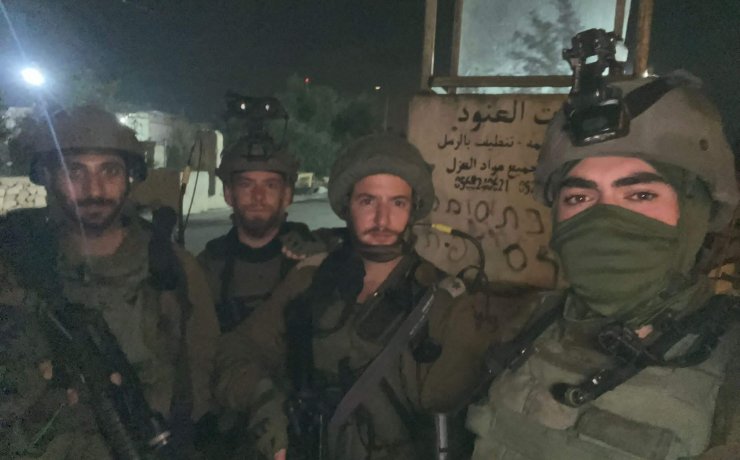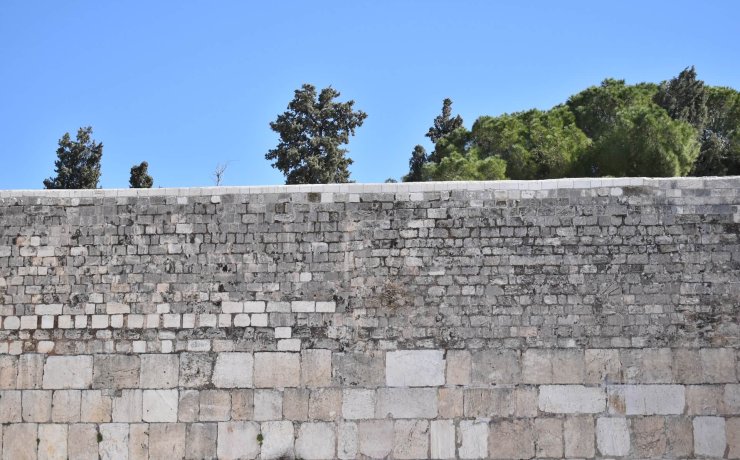The standard Jewish question to moments of hardship is, “Why did this calamity befall us?” It accompanies us always. When evil befalls, Jews of faith engage in the occupation of “let us search and examine our ways.” We do so both for personal tragedies and, the more so, for national calamities. It is an ancient tradition. The Sages, in multiple places, seek out the underlying cause (or causes) of the destruction of the two Temples. Every Mussaf prayer laments the absence of the sacrificial service with the words, “Because of our sins, we have been exiled from our land.”
Of course, the question does not exclude natural causes, which are always present and always true. In the case of the Simchat Torah calamity, the blackest day Israel has ever experienced, many natural explanations come to mind: Israel’s overreliance on technological sophistication and protective fence; the conception that Gaza’s economic dependence on Israel (coupled with Israel’s military strength) would deter such an attack; the urgency, as dictated by Iran, to thwart Saudi Arabian entry into the Abraham Accords and normalization of relations with Israel (and a host of added geopolitical factors); Israel’s political and social weakness. All these are relevant in explaining how this appalling attack could happen.
Our response, of course, is to fight. “A time for war,” writes Kohelet, “and a time for peace.” Sometimes, you need to wage war in order to reach peace. This, surely, is the case for the hateful enemy on our border sworn to our destruction. It is a time for war.
Yet, alongside the natural analysis, we also search for the underlying meaning of such events within the context of the relationship between Hashem and the Jewish People. Evil is a human product forged by the machinations of human minds and wrought by human hands. Yet, when we suffer its pain, we know that this comes upon us as part of the Divine supervision that accompanies us always. The Rambam thus writes that if we fail to cry out to Hashem when tragedy strikes, claiming that such events are arbitrary, “this is a way of cruelty […] that will lead to further tragedy” (Laws of Fasts 1:3).
Nobody can pretend to know why, in the latter sense, this calamity befell us. We are not prophets, and we are not privy to Hashem’s designs. However, many try to derive messages and outtakes. Not “Why did this happen?” but “What is our calling?” Below, I will try to explain why I find some of the suggestions I have come across unsatisfactory. Following this, I will suggest a message we can focus on that merges both aspects: the natural cause and Divine providence.
***
One rabbinic response, which I read early on in the aftermath of the attack, was modesty. A lack of modesty causes calamities, so we must strengthen ourselves in this area. Later, I saw similar exhortations suggesting other sinful practices that should be corrected. A second approach that many espoused was that we need to repent, yet the specific kind of repentance is left open (one example is a declaration of the Edah Charedis[1]). Each person knows what he needs to improve upon: “The heart knows its own bitterness” (Mishlei 14:10).
Though not without virtue, I have reservations about both approaches, certainly in the present context.
Rabbinic figures often know in advance what they want to strengthen, each according to his disposition, and, like the push of a button, when tragedy strikes (Heaven forbid), the appropriate response is ready
The first approach involves responses – we could label them “boilerplate responses” – that are almost always known in advance. They are eminently predictable, the most common among them being modesty, Internet, bittul Torah, and lashon hara. Rabbinic figures often know in advance what they want to strengthen, each according to his disposition, and, like the push of a button, when tragedy strikes (Heaven forbid), the appropriate response is ready. The template is already there; you only need to fill in the calamity.
The trouble with this methodology is that it lacks the basic quality of listening. It assumes that God speaks a very narrow set of statements and uses a variety of means to say the same thing. But what happens when God wishes to tell us something else? As rich experience teaches, among the worst communication sins is to assume in advance what the other party is going to say. When this becomes too common, there is no capacity for being in a relationship. Listening to Hashem requires us to refrain, as much as possible, from boilerplate responses.
When it comes to such an exceptional calamity as Simchat Torah massacre, this kind of automated response seems all the less satisfying. We are being called to listen.
The second approach, which leaves the subject of repentance to individuals, ignores the definitively national nature of the tragedy we experienced. The attack of Simchat Torah was not against any individual, family, or group but targeted the entire nation. It stands to reason that a decidedly national disaster calls for a national reckoning and not one that is left up to individuals, each with his personal issues and challenges.
This second point is relevant to the first approach, too. Often, rabbis will highlight issues that are relevant to their local communities and groups: one with a modesty issue, another dealing with too much talking in Shul, and a third that is lax in Shabbat observance. The issues are hardly ever national – common to the nation, as befitting the calamity of Simchat Torah.
***
Another approach to the issue, which a rabbinic acquaintance published under the title “The Attitude Towards the Army in These Harsh Times,”[2] blames secularism and secular society for the calamity. I find this attitude egregious and (on a bad day) even contemptible, yet I choose to cite it because it seems to me that many have adopted it, at least partially.
“Living here requires us to live as Jews,” wrote my rabbinic acquaintance, “and if we don’t live as Jews, things could end up very badly.” “We must not distort the reality: the party that ended in a horrific massacre, which our secular Prime Minister defined as youth who went out to party with nature, was a party of incest and idolatry […] thousands of people danced in front of the golden calf […] and Divine wrath lashed out.”
Beyond the appalling insensitivity towards the victims and their families, many of whom were young, innocent, and precious Jews who had floundered in the complex maze of life, is it plausible to attribute the blame on secularism in general and the victims in particular?
The culprits, according to this, are the partygoers and their secular partners in culture. “It hurts very much that Jews are dying,” he added, “even wicked Jews.” “Yet, there is a principle that we must always know: our entire existence depends on our Judaism […], and when there is Divine wrath. We will not change the Torah.” “Secular Judaism has no legitimacy!” shouted one of the captions. This, according to my rabbinic friend, is the principal message of the disaster.
It is quite forbidden, in my opinion, to write this way. Beyond the appalling insensitivity towards the victims and their families, many of whom were young, innocent, and precious Jews who had floundered in the complex maze of life (one of the victims’ brothers is in my son’s class), is it plausible to attribute the blame on secularism in general and the victims in particular? How would we feel if a parallel accusation was leveled against the Charedi victims after the Meron disaster?
Moreover, it makes little sense to relate a calamity of national proportions to a rave party, the likes of which take place on a weekly basis throughout the year. Throughout its 75 years, the State of Israel has become progressively more religious. It is true that over the last few months, protestors took to the streets in protest of a perceived threat from the religious right, but this terrible surely did not mean to inform us that “the other side is wrong.” As Rabbi David Cohen (Rosh Yeshiva of Chevron) wrote in a letter to his students, when faced with disaster, the last thing we should be doing is pointing the finger at the other side.
***
“My thoughts are not your thoughts, nor your ways My ways,” says Hashem. We cannot know the ways of Hashem, but we can try to listen to the message He is conveying. In the current situation, there is one issue that cries out to the heavens: unity. Immediately before the calamity of Simchat Torah, we had reached an unimaginable low, on the brink of civil war. And what were we at each other’s throats over? The reasonableness clause, the Basic Law of Torah Study, partitions between the sexes in prayer gatherings on the street, and a host of eminently solvable political and social issues.
Certainly, deep divisions do not exist among Israel’s population. However, a modicum of moderation, sensitivity to the other side, and a healthy dose of listening power could have worked wonders. Above all, what we needed so desperately was to internalize that we are all one people and that living up to this brotherhood requires a readiness to shift for the sake of unity.
This would mean different concessions for different groups. For the left, it could mean that you don’t have a monopoly on values, including those of Israel’s public sphere; others, most notably Jewish values, deserve representation. For the right, it could mean that even a full-throttle right-wing government cannot have it all. And for the Charedim, it could mean a greater readiness to participate in Israel. For all of us, it means leaving our comfort zones for the sake of brotherhood and unity.
The terrible blow we received on the unique day of Simchat Torah, a blow that our enemy was emboldened to strike, by its own testimony, due to our state of discord and disharmony, tolls us back to the simple insight: yes, we are brothers
Simchat Torah is a day on which we annually achieve this unity. For many, it is time when we join with others, sometimes other communities that we see little of during the year, and celebrate together in the equivalence of a circle. The terrible blow we received on the unique day of Simchat Torah, a blow that our enemy was emboldened to strike, by its own testimony, due to our state of discord and disharmony, tolls us back to the simple insight: yes, we are brothers. Unable to dance together, we were forced to fight together and die for each other.
This does not mean that we should abandon the concepts of right and wrong, good and its opposite. The international reaction to the Gaza War reminds us how crucial it is to remember the distinction and to base moral judgment on the values of good and evil rather than on a value-empty accounting of suffering. However, when it comes to the Jewish People, the value of Shalom, of internal peace, must never be forgotten. We must strive for truth. And we need to do so together.
***
During the First World War, Rabbi Yissachar Dov Rokeach, the Belzer rebbe and among the most influential Orthodox leaders of his time, was approached by a group of elder Hasidim to declare that we must urge the people to repent their ways, for only repentance can remedy the harsh troubles the Jews were experiencing. The rebbe refused adamantly. Instead of condemning those who had strayed from religious observance and urging teshuvah, he stated: “The main thing is that Jews should love one another. […] This is what our salvation depends on.”
Instead of condemning those who had strayed from religious observance and urging teshuvah, he stated: “The main thing is that Jews should love one another. […] This is what our salvation depends on.”
Rabbi Yissachar Shlomo Teichtel, who cites his words in his Eim Habanim Semeicha, concludes by writing: “Don’t be a righteous fool to find guilt among the Jewish people and sow division between them, certainly not when the attribute of Divine judgment is stretched out upon us.” I heard the very same statement from my rebbe, Rabbi Asher Weiss, shlita, about the Kloisenberger Rebbe: though he could be fiercely critical in peacetime, he was always careful to preach love and unity in wartime. So must we.
We have seen tremendous courage and self-sacrifice in the days and weeks since that fateful Simchat Torah. We have seen remarkable expressions of simple Jewish faith. We have seen unprecedented commitment and dedication. We have seen the heroism of soldiers and policemen alongside ZAKA volunteers. We have seen the pureness of Jewish unity, a fractured nation coming together.
We cannot know what the future still holds for us. But we know that together, we will prevail.
Unity is no abstract idea. It demands concessions from all parties. As to particular details, there will be time to consider the matter when the war is over. For now, it is incumbent upon us to internalize the simple words of the Belzer Rebbe: We are all one people. If we only do so, perhaps the excruciating suffering of Simchat Torah can become labor pains that draw us closer to better times.
[1] See here: In the midst of the war: Anti-Zionist haredi community announces day of prayer (israelnationalnews.com).
[2] Available here: https://drive.google.com/file/d/174QJw8XI5RX4JzBzZA1M_P-Dy-hcaz7z/view?usp=sharing.
In the photo: Yeshiva students tie tzitzis garments to meet unprecedented demand at army bases.






I do not think that we should indulge in asking why the events of 10/7 occurred but rather acting in unified fashion regardless of our perspectives to fight what us clearly evil The question of what went wrong etc at this very raw moment can only lead to dividing Klal Yisrael when unity is the call and demand of the hour with all of us realizing that we are on the same foxhole
Interesting that calamities seem to be due to other’s shortcomings rather than those of the interpreters of the ratzon elyon.
Hashem Oz Lamo Yiten Hashem Yvarech Et Amo Bashalom
Thank you for this excellent article.
Where is the story of the Belzer Rebbe printed in the ספר אם הבנים שמחה?
תודה!